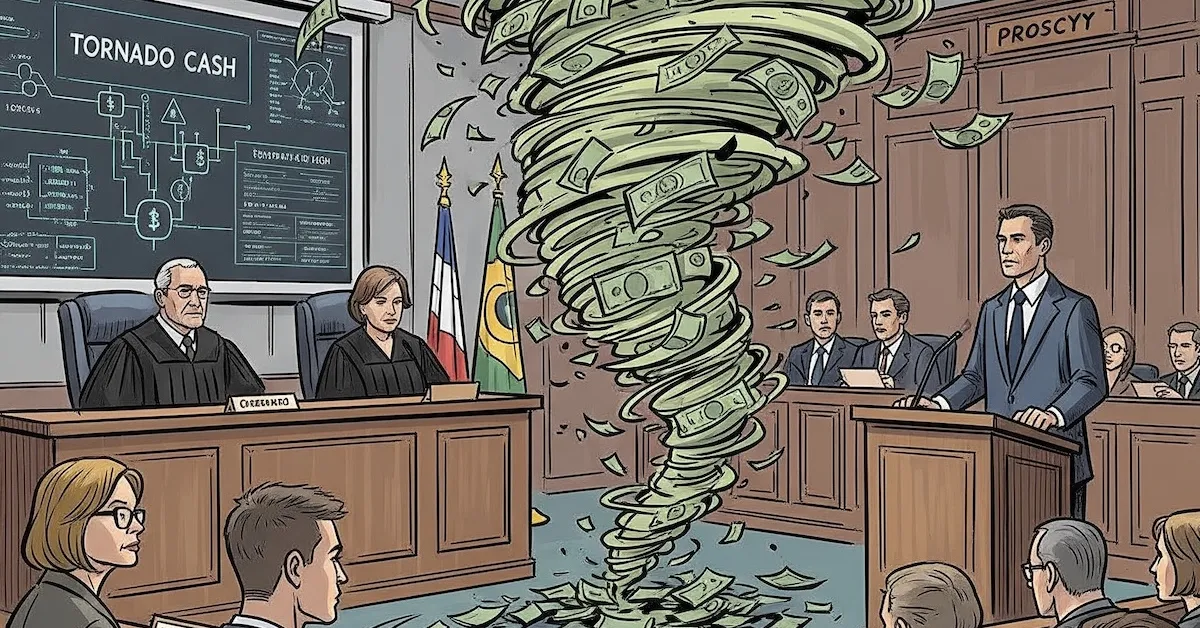Tornado Cash Verdict Sends Shockwaves: Roman Storm Found Guilty on Key Count

The high-profile Tornado Cash trial has concluded in the Southern District of New York (SDNY), with co-founder Roman Storm found guilty on the charge of conspiracy to operate an unlicensed money transmitting business. This verdict carries significant implications for developers of noncustodial Bitcoin and crypto technology, as well as privacy-preserving software, raising concerns about the future of innovation in the crypto space. The jury, after three and a half days of deliberation, did not reach a unanimous verdict on the other two counts: conspiracy to commit money laundering and conspiracy to violate sanctions. As a result of the conviction on the money transmission charge, Storm now faces a potential prison sentence of up to five years.
Amanda Tuminelli, executive director and chief legal officer for the DeFi Education Fund, closely followed the trial and provided an expert perspective on its complexities. She detailed the three charges initially levied against Roman Storm, focusing heavily on the conspiracy to operate an unlicensed money transmitting business. Tuminelli, an expert on 18 U.S. Code § 1960, the U.S. federal law prohibiting unlicensed money transmitting businesses, argued that Storm had not violated this statute in creating and operating Tornado Cash, an Ethereum-based crypto mixing service. Her analysis highlighted the distinction between developing technology and operating a money transmitting business, a crucial point for developers.
Further complicating the legal landscape, Tuminelli pointed to legislative efforts like the CLARITY Act and the Blockchain Regulatory Certainty Act (BRCA). These proposed bills explicitly include language designed to protect developers of “non-controlling” (noncustodial) crypto technology, stipulating that such developers and purveyors should not require a money transmitting license nor be subject to existing money transmission laws. This legislative push underscores the ongoing debate about how existing financial regulations apply to decentralized technologies.
A significant point of contention discussed by Tuminelli was the Department of Justice’s (DoJ) perceived shift away from 2019 FinCEN guidance, which she believes threatens innovation in the crypto space. This shift could create a scenario where the U.S. government continues to prosecute other developers similar to Storm, despite a memo from U.S. Deputy Attorney General Todd Blanche in April stating that the DoJ would cease targeting crypto entities, including mixing and tumbling services, for the acts of their end users. This apparent contradiction between policy statements and prosecutorial actions adds to the uncertainty faced by the crypto community.
Following the guilty verdict, the prosecution moved to remand Storm into custody, arguing he was a flight risk. However, Judge Failla rejected this motion. The defense, led by Ms. Klein, successfully argued against the remand, citing Storm's strong ties to the United States, including his Washington state home tied to a $2 million bail bond, his daughter and girlfriend residing in the U.S., and his parents being green card holders. Judge Failla noted that the "stability of the verdict is still in play," likely referencing the anticipated appeal, and acknowledged that Storm's "incentives have shifted tremendously," thus denying the prosecution's request.
Shortly after the verdict, U.S. Attorney for the SDNY Jay Clayton issued a strong statement condemning Storm and Tornado Cash. Clayton asserted that "Roman Storm and Tornado Cash provided a service for North Korean hackers and other criminals to move and hide more than $1 billion of dirty money." While acknowledging the promise of stablecoins and digital assets, he stressed that this promise "cannot be an excuse for criminality." Clayton vowed the Office’s commitment to holding accountable those who exploit emerging technologies for crime. Notably, Clayton's statement did not acknowledge Deputy Attorney General Todd Blanche's memo regarding the DoJ's stance on virtual currency mixing services, nor did it mention that the vast majority of funds moved through Tornado Cash users were not proven to have been obtained illicitly. The outcome of this trial sets a precedent and will undoubtedly be a central point of discussion as the legal framework for decentralized finance continues to evolve.
You may also like...
Sports Betting in Africa: Quick Money or Long-Term Addiction?

"Is sports betting in Africa an opportunity for wealth or a trap for addiction? Explore its impact on youth, the role of...
October 2nd: Guinea’s Independence—A Nation With Defiant Beginning and Enduring Story

On October 2, 1958, Guinea made history as the first French colony in Sub-Saharan Africa to boldly declare independence....
The Jumia Story: Lessons From Africa’s First Tech Unicorn

Discover the story of Jumia, Africa’s first tech unicorn, and how platforms like Glovo and Bokku are reshaping e-commerc...
The Silent Cognitive Crisis: Brain Complacency in the Age of AI

“AI offers convenience, but at what cost? Explore how over-reliance on artificial intelligence fuels brain complacency, ...
Legacy Continues: Football Royalty's Son Nets Stunning Screamer for Barcelona Youth

Shane Kluivert, son of Dutch football legend Patrick Kluivert, scored a spectacular 'screamer' for Barcelona's Under-19s...
WNBA Star's Terrifying Health Ordeal: Mitchell Reveals Rhabdomyolysis Left Her Paralyzed

Indiana Fever All-Star guard Kelsey Mitchell revealed she suffered from Rhabdomyolysis during a WNBA semifinal game, cau...
Warner Bros' Box Office Bubble Bursts, But Industry Shrugs: What Does It Mean?

Paul Thomas Anderson's "One Battle After Another" marks a different kind of success for Warner Bros., earning critical a...
DCU's Nightmare: Are Film Franchises Repeating MCU's Fatal Flaws?

The DCU's increasing interconnectivity, particularly in <i>Peacemaker</i> Season 2, is raising concerns about potential ...